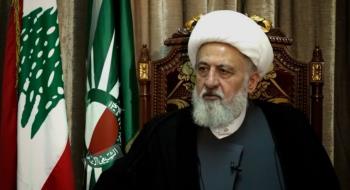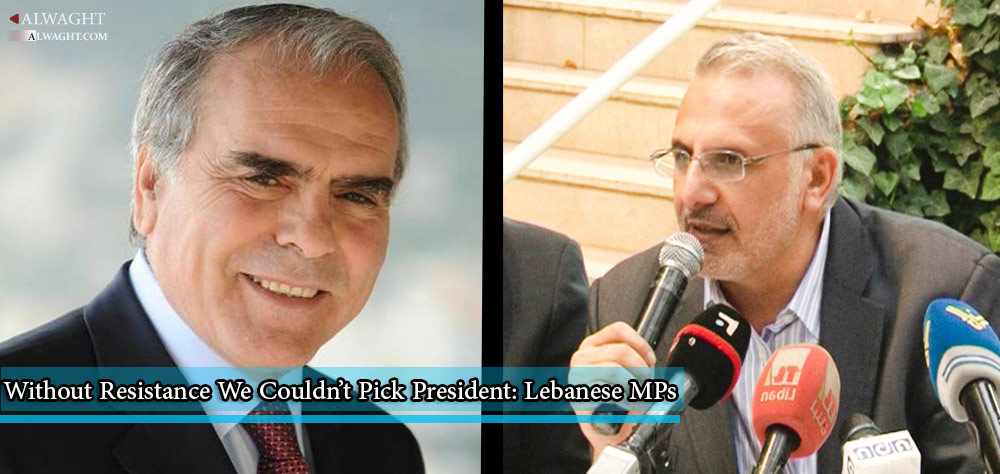Alwaght- The Lebanese parliament elected Michel Aoun president to terminate a political limbo that lasted for almost two and a half years.
The parliament’s meeting to pick the president had been delayed several times, but now the political parties have agreed to let the leader of the Free Patriotic Movement to take the post and end the political deadlock.
Alwaght has covered an array of topics including picking the Michel Aoun as the 13th president of Lebanon to end a 29-month political stalemate, the happenings of the picking meeting, and other issues in an interview with the Lebanese members of the parliament Ali Miqdad and Emile Rahme.
The full text of the interview is as follows:
Alwaght: Who do you think is the winner now after picking Michel Aoun president for the country?
Rahme: First of all, today Lebanon has come out as winner along with the Axis of Resistance. Hezbollah has proven that it is the honest movement that saved Lebanon. Without the sacrifices of the Lebanese resistance’s martyrs, who we set to go to Baalbek to take part in funeral service of three of them after ending the presidential election, we couldn’t exercise our right and hold the meeting to choose the president. So, we chose Michel Aoun while the martyrs were being killed in defense of the country. Some sides say they were killed in Syria’s Aleppo and so Lebanon has nothing to do with them. But I tell them as a Lebanese MP that with fall of Aleppo, Damascus will fall, and then comes the turn of Beirut. Actually, they are linked to each other. The fighters of the Resistance movement are defending us and Lebanon. They are protecting Lebanon all the time against the danger of terrorism. They provide us with stability and security to do what we did today and what we will do tomorrow.
Miqdad: The time we are living now is the time of success of Lebanon as a whole, the people, and the Resistance, and today everybody wants good, dignity, and glory for the country. There are no losers and winners here. The only winner is Lebanon, and those who sacrifice for Lebanon are today stand as winners.
Alwaght: What is the major challenge Michel Aoun and actually all the Lebanese have ahead after crossing the presidential limbo?
Rahme: The upcoming days are difficult because there is political difference, as at the same time there are disagreements on strategy and in all levels in general. We should face the fact. There are two different lines and opinions in the country, and there are divisions between the politicians. For example, I as an MP support any steps Hezbollah takes to save our camp and save Lebanon as a whole. Or as an example another MP opposes me and firmly comes against my opinions. So, there are unavoidable problems in politics in Lebanon. But now we are supposed to manage our other works that we can manage. On domestic and regional levels there are difficulties that are expected to show face, and the clearest of them is forming the government.
Miqdad: There is a set of challenges and camps that will face us in the future, the most important of them is confrontation of the takfirist terrorism that is hitting the region. At the same time, we shouldn’t forget the Israeli challenges and dangers and the need for us to liberate our occupied territories. Additionally, there are a lot of domestic cases. Economic, oil, water, and electricity power cases. These all urge us all to stand shoulder to shoulder and bear the responsibility through backing the new president who must work hard all the time to take the country to security and stability.
Alwaght: President Aoun in his oath-taking speech talked about preemptive steps to protect Lebanon. What did he mean by this? Is this a hint indicating continuation of his support for Hezbollah’s moves in the future?
Rahme: The term of preemptive measures by Aoun in the oath-taking speech is applicable only on (Hezbollah’s) moves in (Syria’s) Al-Qaseer, Qalamun, and Al-Zabadani and other places. Actually, this means Aoun’s backing for what Hezbollah is doing and a support for Hezbollah’s confrontation of terrorism. Today, Aoun as a president of the country talked about preemptive measures, meaning that we should not disregard preemptive steps to repel dangers the country is facing before they arrive. This job was done and is being done by the men of Resistance in different battlegrounds.
Miqdad: I think the (Aoun’s) speech was comprehensive and distinctively patriotic. Whatever it included was expressive of the degree of its seriousness and responsibility. Every word echoed a sense, but in general the speech was full of large-scale commitment and responsibility, as it was largely patriotic. I hope that with support from all of the Lebanese people, the political parties, and the cabinet that will form a national unity government the president can lead the country to stability and anything he is urged to do for the country.
Alwaght: What do you think about the disorder that took place at the parliament while the meeting to pick the president was rolling on?
Rahme: What happened was a big disgrace for Lebanon as a whole. A colleague of us descended to this low level. If this had taken place once there was no problem, but we saw the scene took place twice. This could risk making divisions again. What happened was an unprecedented scene and was degrading for the parliament and the government as a whole, especially that it happened in front of the foreign ambassadors in the meeting. The MP who did this for the second time proved that he was doing so for a purpose.
Miqdad: Unfortunately, some did not act according to good manners. They are not wise representatives of the Lebanese people who chose them. This level of acting is very disgraceful, and I think no other member of the parliament can ascend to this level. Anyway, we should consider the right side of the story and say that what happened was a mistake at that time. Whoever did this actually displayed his silliness and such people should not be in a parliament that represents the nation.
Alwaght: What do you think about the promotions that suggest Aoun has acceded to maintain the 1960 Electoral Law according to a deal with Saad Hariri?
Rahme: I have no idea if Aoun has accepted the 1960 Electoral Law as some sides promote in an agreement with Hariri, but I am sure of Aoun’s honesty and firmness. In his inaugural speech he raised new parliamentary elections law. If he had not made these remarks during the speech, we could speculate on his agreement to uphold the 1960 Electoral Law. Anyway, this is very unlikely.
Alwaght: What is your idea about the smooth stances of the head of Amal Movement Nabih Berri and the leader of Marada Movement Suleiman Franjieh in dealing with this election? Do you think they along with the other political parties will back President Aoun?
Miqdad: Concerning Berri and Franjieh, I should tell you that they work hard for stability of Lebanon, and to protect it and save it. What Berri and Franjieh and others do today is a complementary role. Nobody can turn a blind eye to this role and importance to protect the country and keep it secure. This is a key role and more crucial than any other time. We never doubt believing that Berri will be a pillar of stability in the future and will do whatever needed for better conditions.



























